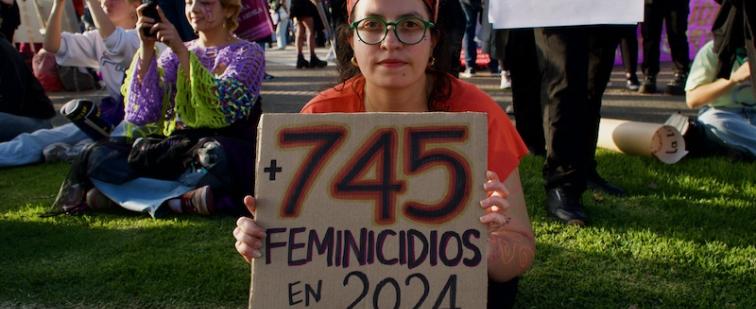Home
The Canadian House of Commons passed a free trade agreement with Colombia on June 14, representing the deal's final major legislative hurdle. It still has to go through the Senate and be signed by the governor general, but this is basically a formality. For years Canadian activists have tenaciously fought to stave off the deal, which again represents the hemispheric vision and plans of the United States and Canada in the region based on the failed NAFTA model.
This article originally appeared in the May/June 2010 edition of NACLA Report on the Americas.
Aggression against journalists in Mexico often gets lost in the murky impunity of the country’s violent drug war. However, a report by Mexican freedom-of-the-press organizations asserts that 65% of attacks on journalists have been not at the hands of drug cartels, but rather at the hands of the state. This interview is with independent journalist and writer Laura Castellanos. On May 10 still-unknown assailants ransacked her apartment, stealing only her laptop and reporter's pad, while leaving other items of value behind. Castellanos's experience is only one more incident in the recent surge of violence against journalists in Mexico, the most dangerous place for the profession in Latin America, according to Reporters Without Borders.
On May 18 Brazilian President Luís Inácio Lula da Silva and Turkish Prime Minister Tayyip Erdogan negotiated with Iranian president Mahmoud Ahmadinejad regarding Iran's stockpile of low-enriched uranium. The success of the negotiations was hailed internationally, sealing Brazil’s designation as a rising global power in what many are calling a new multi-polar world. However, this new wave of south-to-south solidarity also challenges what once was Washington’s unipolar stranglehold on global politics.
The Service Employee International Union (SEIU) continues to defy the trend of record-low union membership in the United States. After doubling its membership from 1.2 million in 2000 to 2.2 million today, it is among the fastest growing unions in the country. Indeed, the union’s long history of innovation and transformation at least partially explains its growth, as depicted in Ken Loach’s critically-acclaimed film Bread and Roses (2000), which focused on the union's Justice for Janitors campaign. Now the SEIU is proposing to unite janitors with security guards, a traditionally African-American dominated labor force. This gritty work of creating solidarity across ethnic lines is perhaps the most significant response to the hostile anti-immigrant climate that pervades the United States today.
The high-gloss, made-for-flat-screen multi-billion dollar signing ceremonies between Chinese and Latin American officials have been staged to portray the triumphant return of the New International Economic Order. Yes, it’s true, the Global South is banding together again to trade once more. But wait a minute. Why are recent reports by the World Bank and the Organization for Economic Cooperation and Development also hailing this increase in China–Latin American trade relations?
This article originally appeared in the May/June 2010 edition of NACLA Report on the Americas.
Monday, May 24 marked the sixth week of a student strike at the University of Puerto Rico after protests began on April 21. Students are protesting $100 million budget cuts, increases in tuition, and changes to the university program. The student strike was intended to be only a 48 hour stoppage, but university officials were unwilling to negotiate with students. Now, after six weeks, the strike continues amidst reports of police brutality. International support is increasing for the students, including from New Yorkers who held a rally on May 18.
While the results of Bolivia’s April 4 regional and local elections are now officially certified, their significance—who really won and lost—continues to be debated. President Evo Morales's political party MAS has extended the geographic reach of its support, making important gains in the resource-rich lowland regions, a bastion of the right-wing opposition. But the vote also shows that MAS is far from a hegemonic political machine. Moreover, the major political challenge confronting them today is coming not from the largely discredited right, but from emergent new forces on the left, including strong, local grass-roots initiatives.
The trade policies enacted under the Clinton administration in the 1990s ruled out the possibility of a future for Haiti’s roughly 3 million small farmers. This is according to the former U.S. president himself. In March, Clinton, who is now the UN Special Envoy to Haiti, admitted that U.S. free market agricultural policy towards Haiti “has not worked." However, when discussing the possible future of Haiti’s agriculture at the International Donor’s Conference in New York on March 31, Clinton did not mention restoring the rice crop he helped destroy.
During the electoral campaign leading up to the May 6 elections in Britain, immigration proved to be an explosive issue, second only to concerns about the recession. For the 88,000 Latin American immigrants living in the country, hopes for immigration reform hang in the balance of these elections. However, much like in the United States, instead of campaign platforms that offered practical solutions to the issue, a reactionary hard-fisted rhetoric dominated the political landscape. The unwieldy elections have produced an uncomfortable coalition from both sides of Britain's political spectrum, with its immigration policies yet to be defined.
Few incidents have galvanized the Puerto Rican nation as much as the FBI’s extra-judicial killing of independence leader Filiberto Ojeda Ríos in September 2005. Indeed, the politically divided country exploded in outrage over the incident, and Ojeda Ríos’s funeral procession was the largest ever attended in the island’s history. With a personal and powerful testimony Elma Beatriz Rosado remembers her husband, the fallen martyr whose message is never far off, at a time when the U.S. Congress is reviewing legislation that proposes a change in the island’s status.











